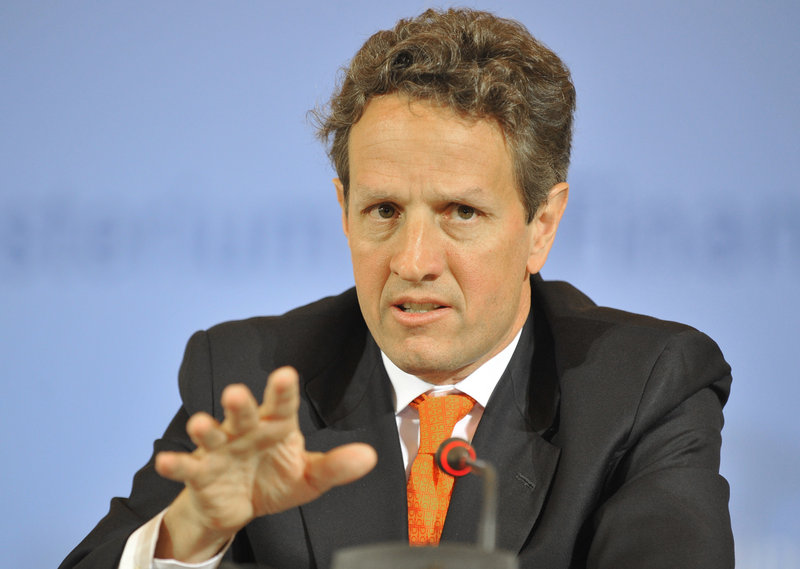BERLIN — Top U.S. and German officials Thursday acknowledged differences over key financial regulation issues, and said a “broad agreement” on basic concepts may not produce uniform rules in all of the world’s capital markets.
After what German Finance Minister Wolfgang Schaeuble described as “very intense discussions,” Treasury Secretary Timothy Geithner ended a two-day European trip meant to smooth out differences in how the major economies are approaching financial regulation in the wake of the recent crisis.
Schaeuble, defending a German approach that has become more unilateral in tone and substance, said that Germany had “done its national homework” before adopting a ban on certain types of stock trading, known as naked short selling. The ban, announced last week, surprised U.S. and European officials, who were expecting cooperation over such decisions.
In addition, Schaeuble said Thursday, new taxes and restrictions had to be tailored to local economic circumstances.
He spoke amid continued uncertainty about the broader European economy. Markets here were up sharply and the euro gained value against the dollar Thursday, a sign of possible trust building in European Union and European Central Bank promises that the continent’s weaker economies, notably Greece and Spain, will not default on their debts.
At the same time, a major budget-cutting plan passed the Spanish parliament by a single vote, and the country’s powerful unions threatened a walkout in a sign of the political tension developing over efforts to reorder European government spending — and its longstanding social compact.
Geithner’s trip was in part an effort to assess where Europe stands and try to keep the larger financial reform effort from being derailed by competing national priorities.
The heads of the world’s major economic powers committed in September in Pittsburgh to try to create a better-regulated and more stable global financial system, and they also agreed that the rules governing banks and traders needed to be roughly similar in the world’s major money centers. Geithner said his talks in London, Frankfurt and Berlin on Wednesday and Thursday left him convinced that European leaders were “completely committed to making sure we move forward” on a number of basic issues — getting banks on a more stable footing, ensuring markets more safely manage risk, and finding ways for the financial sector to more fully bear the cost of the most recent and any future crisis.
But differences have emerged on a host of issues between the United States and Europe:
• The United States favors a more narrowly drawn levy on large firms to underwrite the recent financial crisis, while some European officials — including Schaeuble — want to tax all financial transactions for a fund that might be dedicated to crisis resolution or that might go into each government’s general account.
• Europe wants to more strictly clamp down on what it views as speculators, while the United States is counting more on disclosure and transparency to curb excesses, and U.S. officials speak more frequently about the risk of stifling innovation if regulations become too rigid. Legislation nearing passage on Capitol Hill would force banks to pare many trading-related activities, something Europe feels might hobble its major financial institutions.
• Underlying those technical points: fundamental differences rooted in the nature of the European and American banking systems, and in differing visions of how markets are best controlled.
Other countries involved in the debate, such as South Korea and Canada, have yet another set of priorities based on the fact that their banks did not indulge in some of the riskier practices that caused the recent crisis, and they don’t want punitive taxes imposed on them. The issue is expected to dominate the agenda when leaders of the G-20 group of economically powerful countries meet in Toronto next month.
Geithner said the true depth of the potential disagreement won’t be clear until a committee reports on new recommendations for bank capital standards. The United States favors stronger capital standards for banks and has been upset that European institutions have not made as much progress in clearing bad loans from their books and raising new investment.
Send questions/comments to the editors.



Success. Please wait for the page to reload. If the page does not reload within 5 seconds, please refresh the page.
Enter your email and password to access comments.
Hi, to comment on stories you must . This profile is in addition to your subscription and website login.
Already have a commenting profile? .
Invalid username/password.
Please check your email to confirm and complete your registration.
Only subscribers are eligible to post comments. Please subscribe or login first for digital access. Here’s why.
Use the form below to reset your password. When you've submitted your account email, we will send an email with a reset code.